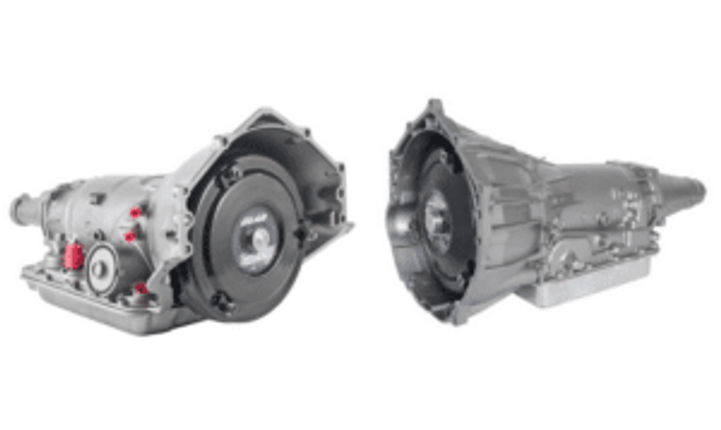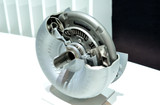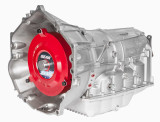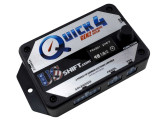Will a 4L60E torque converter fit a 4L65E?
Will a 4L60E torque converter fit a 4L65E transmission? While doable, swapping from an older transmission to a newer or stronger one may call for an upgrade, especially considering the difference in torque and material durability between the 4L60E and the 4L65E. We cover the compatibility between these two GM transmissions and key factors to consider when swapping transmissions.
You’re upgrading or repairing your transmission and find yourself wondering—will your 4L60E torque converter fit your 4L65E transmission? Should you bother buying a new one, or can you make the switch, calibrate the electronics, tune the transmission, and be done with it?
While the two transmissions seem very similar, there are distinct differences in performance and durability. Choosing the wrong torque converter not only results in poor performance but could also lead to expensive repairs down the road, especially if you’re working with a stronger, rebuilt 4L65E rather than an old stock transmission.
No one wants to risk their vehicle's transmission system because of an oversight. Transmission components are complex, and knowing what fits and what can’t will save both time and money. Let’s dive into the specifics.
How a Torque Converter Works
A torque converter is a fluid coupling device used in automatic transmissions to transfer power from the engine to the transmission. It allows the vehicle to come to a stop without stalling the engine and enables smooth acceleration by multiplying engine torque when needed.
To do this, the torque converter utilizes three components – a pump connected to the flywheel of the engine, a turbine installed on the input shaft which spins when struck with the transmission fluid from the pump, and a stator between the two, which redirects the flow of fluid returning from the turbine to the pump, improving efficiency and maximizing torque.
Are 4L60E and 4L65E Torque Converters Interchangeable?
Torque converters are the translation between the engine and the transmission, so having the right one is fairly important. Furthermore, you can benefit from installing a modern torque converter rather than relying on the older stock converter that came with your 4L60E. The lock-up clutch on modern torque converters eliminates slippage, improves fuel efficiency, reduces heat, and boosts performance.
Aftermarket torque converters are generally interchangeable for the 4L60E, 4L65E, and in some cases the 4L75E as well. While the stock will serve you just fine, investing in a modern torque converter is recommended if you’re aiming to get the most out of your car, either performance-wise or in terms of the longevity of the engine and transmission.
In terms of physical fitment, the 4L60E, and the 4L65E are largely interchangeable when it comes to the torque converter, and torque converters built for either tend to be built for both and will get the job done.
Factors to Consider Before Swapping Torque Converters
While the 4L60E and 4L65E are interchangeable in a couple of ways, that isn’t always the case when making more drastic changes in transmission, such as a jump from the 700R4 to the 4L65E. You will want to consider a few factors before swapping:
Stall Speed
Stall speed is the point at which the torque converter allows the engine to transfer full power to the transmission, and it directly affects how your vehicle launches from a stop. Choosing a torque converter with the right stall speed is essential for performance.
A higher stall speed (e.g., 5,000 RPM) is better for performance applications like drag racing, where you want the engine to rev higher before engaging the transmission for quicker take-off.
A lower stall speed (e.g., 1,500–2,000 RPM) is more suited for daily driving or towing.
Physical Compatibility
If the torque converter doesn’t physically fit or properly engage with your transmission (e.g., different spline counts or incompatible bolt patterns), it can’t function. Always confirm that the torque converter is designed for your specific transmission model.
Engine Torque and Power Output
Your new torque converter must be able to handle the power output of your engine, especially in high-performance applications. If your engine produces more torque than the torque converter is rated for, you can experience slippage, overheating, or even failure of the torque converter.
On the other hand, a torque converter rated for more power than your engine produces can lead to inefficient power transfer. Too much of a ceiling on your torque converter isn’t exactly better.
Vehicle Application
Whether you’re building for daily driving, towing, or performance racing plays a major role in the type of torque converter you should choose. There are specialized converters for towing, racing, and street performance.
Lock-Up vs. Non-Lock-Up Torque Converters
As mentioned earlier, a lock-up torque converter has a clutch mechanism that locks the converter at higher speeds, creating a direct mechanical link between the engine and transmission. A non-lock-up torque converter always uses fluid to transmit power, without a mechanical lock. Lock-up converters are more fuel-efficient and produce less heat because they eliminate slippage at cruising speeds.
Cooling and Heat Management
Torque converters generate heat during operation, and excessive heat can lead to transmission failure. Higher stall speed converters and those used in performance or towing applications generate significant heat. Without proper cooling, the transmission fluid can overheat. If you’re upgrading to a higher-performance torque converter, consider adding an external transmission cooler to help manage heat and prolong the life of both the converter and transmission.
Lastly, if the flexplate and torque converter don’t align properly, the torque converter won’t be able to bolt onto the engine, leading to misalignment and potential damage. Make sure that the torque converter is compatible with your engine’s flexplate design, bolt pattern, and balance to avoid issues during installation.
Conclusion
Will a 4L60E torque converter fit a 4L65E transmission? Yes, under most circumstances. Most aftermarket torque converters for either transmission will also work for the other. But when swapping between transmissions, careful consideration is still important.
Factors such as stall speed, engine power, and vehicle use can significantly affect performance and longevity, and affect which torque converter you should buy.




